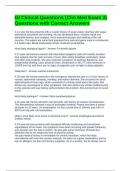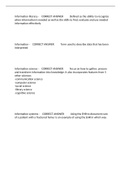GI Clinical Questions (Clin Med Exam 3)
Questions with Correct Answers
A 14-year-old boy presents with a 1-week history of acute watery diarrhea with vague
abdominal discomfort and vomiting. He has developed fever, malaise, facial and
periorbital edema, and myalgias. He is experiencing pain and swelling of the calf
muscles. The patient ate some food prepared from pork and game meat in a restaurant
3-4 weeks ago. Blood examination shows moderate eosinophilia.
Most likely etiological agent? - Answer-Trichinella spiralis
A 27-year-old woman presents with intermittent epigastric pain of 6 months duration.
She explains that her pain worsens 2 hours after eating breakfast, particularly cereal
and other milk products. She also endorses symptoms of diarrhea, flatulence, and
postprandial bloating. Upon physical exam, temperature is 98.1°F, blood pressure is
120/80 mm Hg, and there are no signs of epigastric pain on light or deep palpation.
Diagnosis? - Answer-Lactose intolerance
A 28-year-old woman presents to the emergency department due to a 3-hour history of
nausea, abdominal cramping, vomiting, and watery diarrhea. She recounts her lunch
approximately 8 hours ago, which consisted of a shrimp salad and a diet soda. She
denies any neurological or other symptoms. She also denies any similar problems prior
to this episode and was feeling well just before this incident. She denies fever or recent
travel.
Most likely pathogen? - Answer-Vibrio parahaemolyticus.
A 45-year-old chronic alcoholic man presents with history of massive hematemesis.
This hematemesis followed a bout of prolonged vomiting. Patient has been a known
alcoholic for 20 years. On examination, he has a pulse rate of 100/min and a BP of
90/70 mm Hg with cold extremities.
what is most likely to be found on physical exam? - Answer-esophageal lacerations
(mallory weiss)
A 53-year-old man presents with increased difficulty swallowing and occasional
regurgitation of his meals. His symptoms have been occurring with greater frequency
and severity over the last 4 months. He also gets some shortness of breath but
attributes that to his weight and lack of physical activity.
His past medical history is remarkable for chronic heartburn, which he treats
intermittently with over-the-counter antacids. He takes no regular medications and he
has no allergies. He has not had any surgeries. He is a smoker, but he denies use of
,alcohol and drugs. He works as a building inspector and he lives with his wife and
children.
The patient is obese, but the rest of his physical exam is normal. Blood tests,
electrocardiogram, and chest X-ray are done in the clinic; they are normal. He is
referred for endoscopy, and esophageal biopsy shows specialized intestinal metaplastic
cells (of columnar epithelium).
Bes - Answer-Esomeprazole (Barrett's esophagus)
A 52-year-old man presents with heartburn associated with reflux of sour-tasting
material into the mouth. Some of these episodes are accompanied by increased
salivation, coughing, and occasional regurgitation of food. Such episodes have become
more frequent during the past 6 months despite treatment over the past several years
with various treatment combinations, including antacids, histamine 2 receptor
antagonists (H2RAs), and protein pump inhibitors (PPIs). He denies any bleeding or
abnormalities in his stools. He is slightly overweight and has mild hypertension, which is
well-controlled with an antihypertensive medication. Vital signs are within normal ranges
and the physical examination is unremarkable. An upper endoscopy reveals a large
hiatal hernia and coalescing linear erosions throughout the esophageal circumference
and a 5.5 cm circumferential cherry red patch above the gastroesophageal junction.
Biopsy of - Answer-Laparoscopic fundoplication
An obese 45-year-old woman presents with intermittent epigastric pain of 3 weeks
duration. She explains that her pain worsens in the evenings and when lying down in
bed. Her pain worsens when she eats chocolate. Upon physical exam, temperature is
98.1°F, blood pressure is 120/80 mm Hg, and there are no signs of epigastric pain on
light or deep palpation.
Diagnosis? - Answer-GERD
Early one afternoon, a 12-year-old boy presents with his parents to the ER with lower
right abdominal pain, anorexia, nausea, and vomiting. He rates his pain at 8/10. Pain
started around the umbilical area and has moved to the right lower abdomen worsening
since the onset of symptoms of nausea and vomiting this morning. He denies any
known history of gastrointestinal disease or recent illnesses. He denies any known ill
contacts. Vital signs include temperature of 101°F, heart rate 80 bpm and regular, blood
pressure 118/70 mm Hg.
What do you expect to find on physical exam? - Answer-Rovsing sign
A 63-year-old woman presents with a 6-month history of worsening difficulty in
swallowing. Shortly after swallowing, she feels like something is getting stuck in her
upper chest, and the sensation lasts long enough to begin causing significant chest
discomfort just behind her breastbone. The difficulty swallowing is often extremely
variable and intermittent; it has not been progressive. It gets to the point that she feels
like she is going to regurgitate her food, and she is also experiencing substantial
, episodes of acid reflux. The difficulty swallowing seems to be worsened by when the
patient is extremely stressed and when she eats hot or cold food. She denies any
weight loss, night sweats, or other significant issues. Physical examination of the patient
is otherwise noncontributory. An extensive gastrointestinal evaluation, which included a
comprehensive endoscopic evaluation, is negative.
Medication? - Answer-Diltiazem- calcium channel blocker (esophageal dysphagia)
A 25-year-old man presents for evaluation of intermittent chest pain. He reports a
burning sensation in his chest 1-2 days per week after eating. The symptoms are worse
with large meals, eating late at night, and excessive alcohol consumption. He denies
difficulty swallowing, weight loss, night sweats, chest pain, use of tobacco, or coughing
up blood. His vital signs and physical examination are unremarkable.
Most appropriate treatment? - Answer-H2 blockers/dietary modifications
then can try PPI
A 65-year-old man presents because a morsel of meat he had eaten 3 days ago
reappeared on his pillow this morning. About a year ago, he noticed difficulty swallowing
—particularly solid foods—which seems to be worsening. His wife complains about his
bad breath, and he notes that people avoid being close to him. He does not drink, does
not smoke, and was in a good health before. His physical examination is within normal
range for his age, except that you notice that he is repeatedly clearing his throat as if he
is embarrassed.
Next best step? - Answer-Barium swallow (Zanker diverticulum)
A 45-year-old man presents with extreme asthenia and weight loss. He has been
suffering from celiac disease for the past 12 years. He is at the highest risk of
developing what type of intestinal malignancy? - Answer-intestinal lymphoma
A 20-year-old female college student presents due to a 7-day history of daily heartburn.
She has never experienced heartburn as bad as she does currently. She is treating it
with over-the-counter histamine-2 receptor antagonist, famotidine, 1 tablet daily. The
patient denies any other significant past medical history and is currently taking a daily
multivitamin and an antihistamine for seasonal allergies. She recently admits to having
increased episodes of headaches that she believes are due to stress. For this reason,
she has been taking ibuprofen 600 mg every 8 hours. She states that she has been
taking this consistently every 8 hours for the last 10 days; she hopes that her
headaches will subside after finals are finished. She also states that she was given
amoxicillin 2 weeks ago for a middle ear infection, which resolved without any further
intervention. She denies any difficulty swallowing, weight loss, night s - Answer-NSAID
(GERD)





